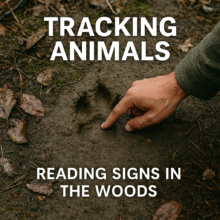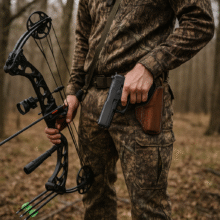Key Hunting Gear Essentials for Safety and Stealth

Hunting, an activity deeply rooted in human history, demands not only skill and patience but also a keen understanding of the right gear for safety and stealth. This comprehensive guide delves into the essential equipment every hunter should possess, ensuring a successful, secure, and discreet experience in the wilderness.
Table of Contents
Table of contents
Introduction
Hunting transcends being a mere outdoor activity; it’s an engagement with nature at its most primal. The right gear can make the difference between a fruitful and a futile hunt. Beyond the success of the hunt, the safety and stealth of the hunter are paramount. This article expands on the essential gear every hunter should have, providing detailed explanations, expert tips, and insights into why each piece is crucial.
Key Hunting Gear Essentials for Safety and Stealth
High-Quality Footwear
- Importance: Proper footwear is essential for navigating the rugged and often unpredictable terrain of the wilderness.
- Features: Look for boots that offer ankle support, waterproofing, and insulation. A good grip and durable construction are also key.
Protective Clothing
- Role of Camouflage: Camouflage helps in blending seamlessly with the environment, a crucial factor for both safety and success.
- Necessary Features: Your clothing should be durable, breathable, and suitable for the weather conditions you’ll be hunting in.
- GPS vs. Traditional Compass and Map: While GPS devices offer modern convenience, the reliability of a compass and map should never be underestimated.
- Effective Use: Familiarize yourself with both GPS technology and traditional navigation methods before your hunt.
First Aid Kit
- Essential Contents: Your kit should include bandages, antiseptics, pain relievers, allergy medications, and personal medications.
- Knowledge and Preparedness: Basic first aid knowledge is as important as the kit itself. Consider taking a course or self-educating on first aid practices.
Communication Devices
- Types: Walkie-talkies, cell phones, and satellite phones each have their place in a hunter’s pack.
- Staying Connected: In remote areas, maintaining a line of communication can be vital in emergencies.
Firearm Safety
- Safe Handling and Transport: Understanding and adhering to firearm safety guidelines is non-negotiable.
- Hunter Education: Engage in courses that educate on the safe use and handling of firearms.
Gear for Stealth
Camouflage
- Types and Uses: Different environments call for different camouflage patterns and styles.
- Blending In: Learn how to effectively use camouflage to become a part of your surroundings.
Scent Control
- Minimizing Human Scent: Human scent can alert prey and hinder the hunt. Use products and techniques to control and minimize your scent.
- Products and Techniques: Scent-eliminating sprays, cover scents, and scent control clothing can be effective.
Noise Reduction
- Quiet Gear Selection: Choose gear and clothing that are designed to be quiet, reducing the chances of startling your prey.
- Silent Movement Techniques: Practice moving silently through different terrains.
Optics and Scopes
- Contribution to Stealth: Quality optics help in spotting game without being detected.
- Choosing Optics: Look for durability, clarity, magnification, and ease of use when selecting scopes and binoculars.
Decoys and Calls
- Attracting Prey Discreetly: Use decoys and calls to attract game to you, rather than pursuing it.
- Realistic Use: Learn the art of using calls and decoys effectively and realistically.
Advanced Gear for the Experienced Hunter
Trail Cameras
- Enhancing Game Understanding: Trail cameras provide insights into animal patterns and behaviors.
- Usage Tips: Place cameras in strategic locations and learn to interpret the data effectively.
Portable Tree Stands and Blinds
- Advantages of Elevated Views: Height can provide a broader view and a strategic advantage.
- Safety Considerations: Always prioritize safety when using elevated platforms.
Specialized Hunting Apps
- Aid from Technology: Various apps can assist in planning your hunt, from weather forecasting to tracking animal movements.
- Recommended Apps: Explore apps tailored to the type of hunting you engage in.
Frequently Asked Questions
Q: What is the most important piece of safety gear for hunters?
A: While all safety gear is important, a comprehensive first aid kit and proper knowledge of its use are crucial. Injuries can happen, and being prepared is key to a safe hunting experience.
Q: How can I effectively use camouflage for different environments?
A: Study the environment you’ll be hunting in and choose camouflage that mimics the local flora and terrain. Practice setting up and moving in your gear to ensure you blend in effectively.
Q: What are the best practices for firearm safety while hunting?
A: Always treat firearms as if they are loaded, keep the muzzle pointed in a safe direction, and be sure of your target and what’s beyond it. Proper training and education are essential.
Q: How do I choose the right optics for my hunting needs?
A: Consider the type of game you’re hunting and the typical distances involved. Look for optics that offer clear, bright images and durable construction to withstand outdoor conditions.
Q: Are there any specific techniques for moving silently in the woods?
A: Practice moving slowly and deliberately, being mindful of where you place your feet. Soft, flexible clothing and gear can also help minimize noise.
As you gear up for your next hunt, remember that the right equipment can significantly enhance your safety and stealth. Each piece of gear, chosen thoughtfully and used wisely, plays a crucial role in the overall experience and success of your hunting adventure. Embrace the blend of skill, knowledge, and the right equipment to ensure a safe, discreet, and rewarding connection with the great outdoors.







